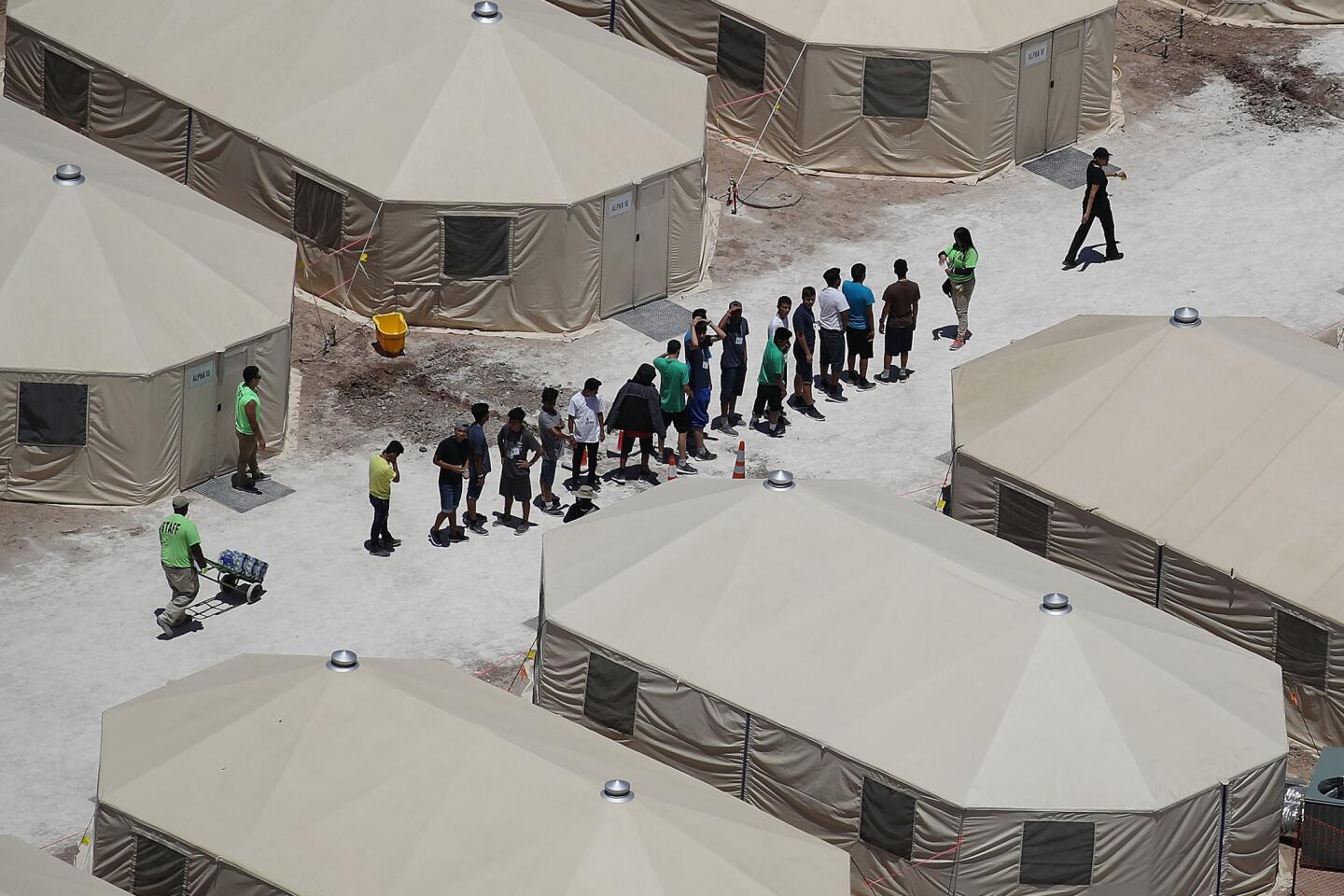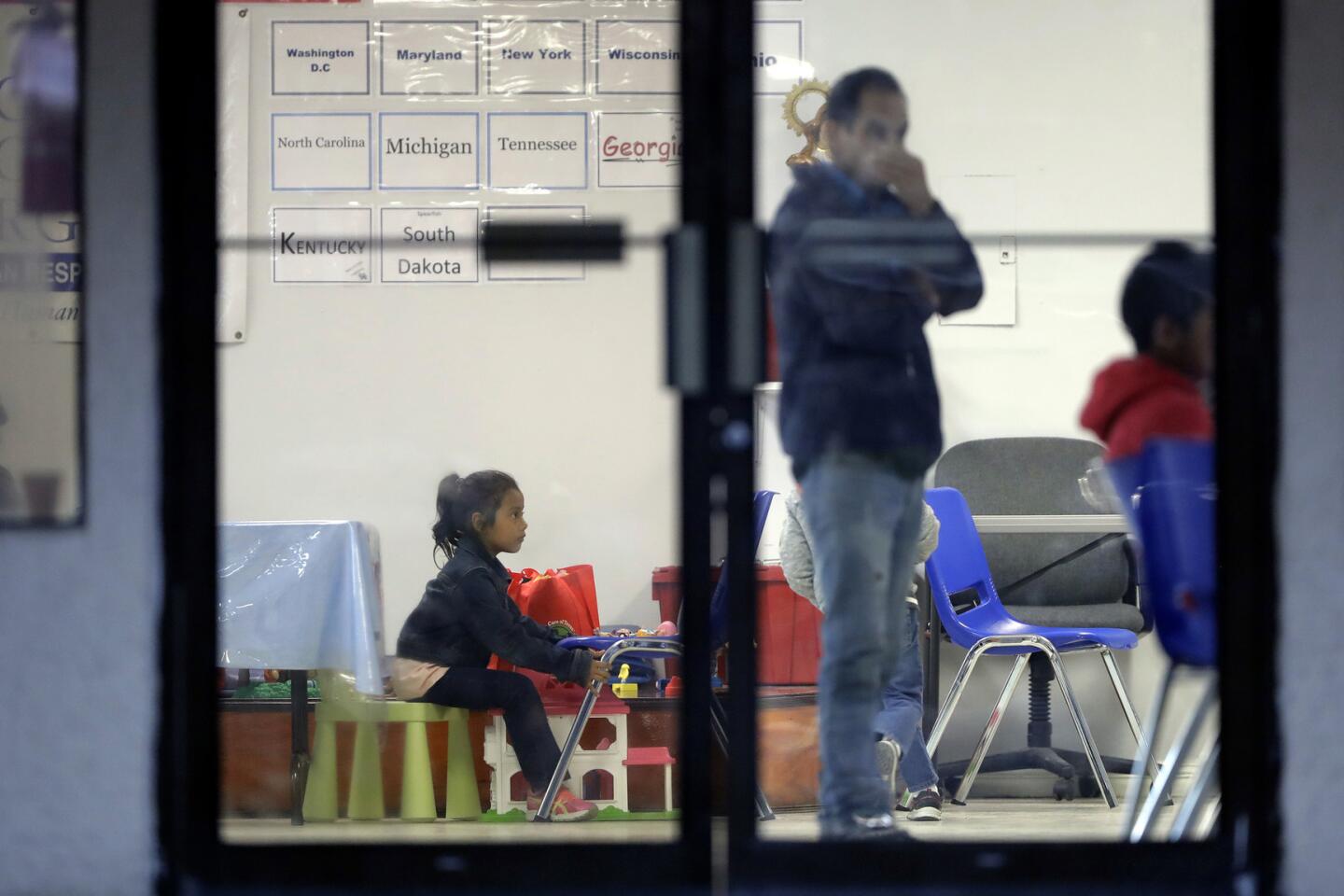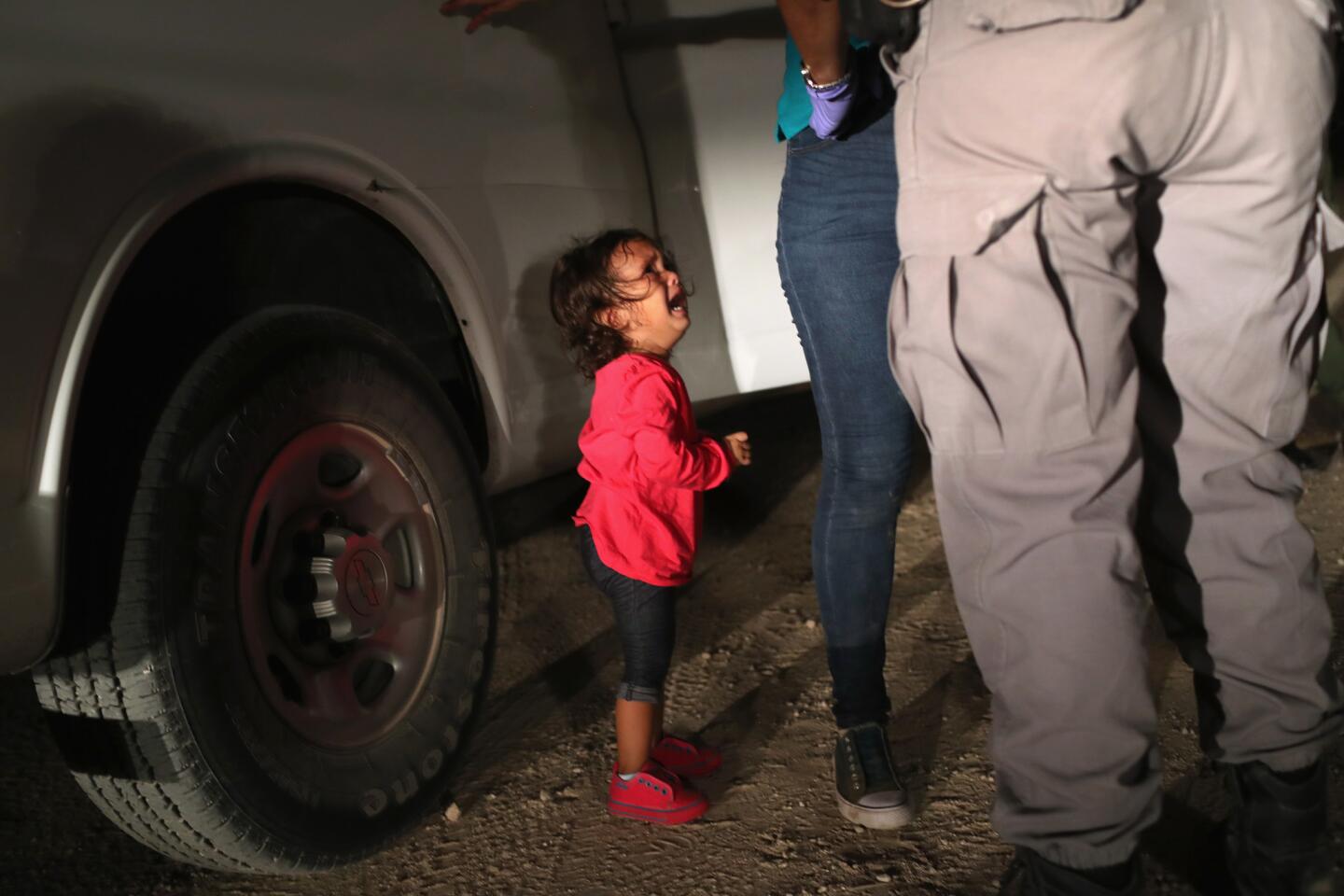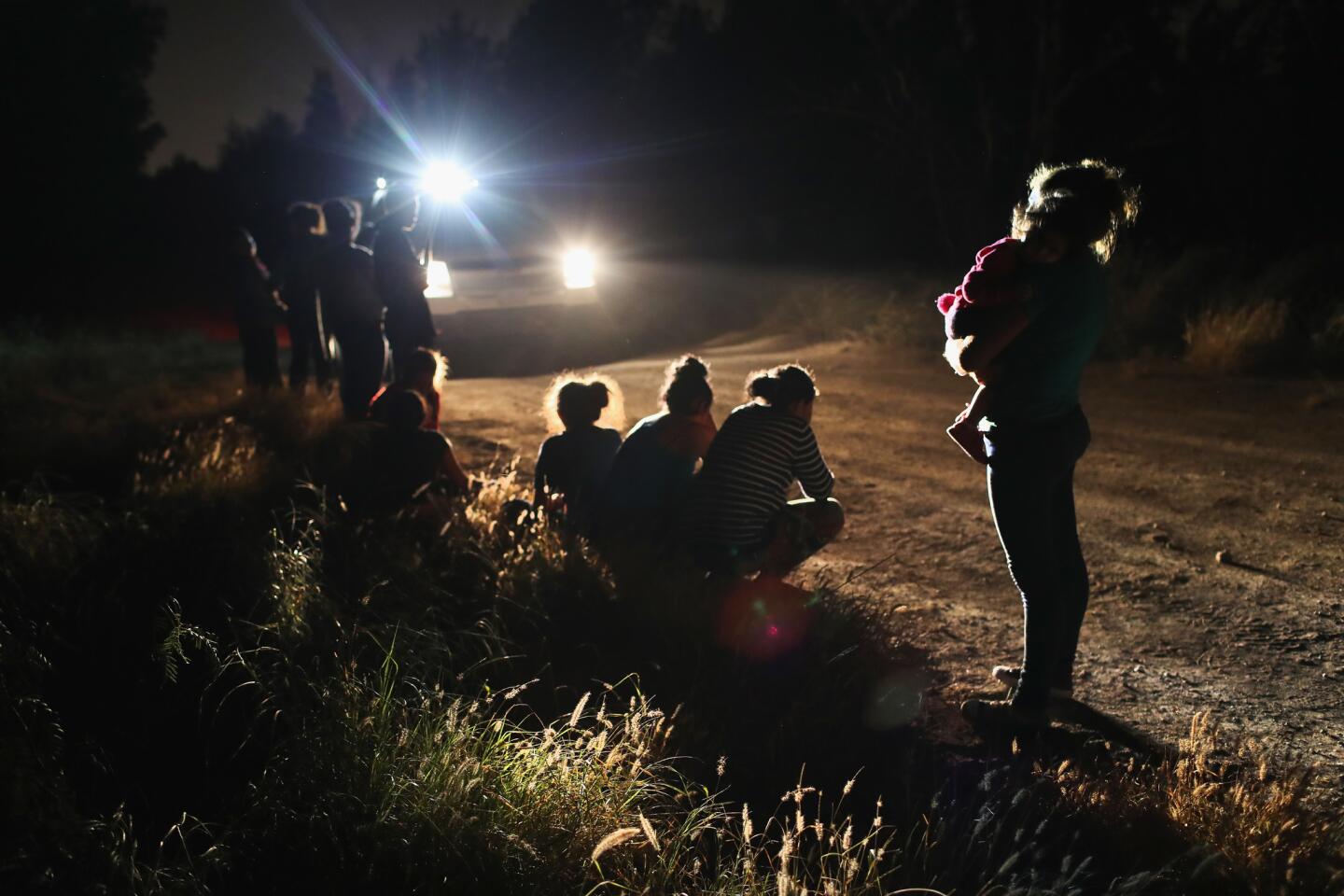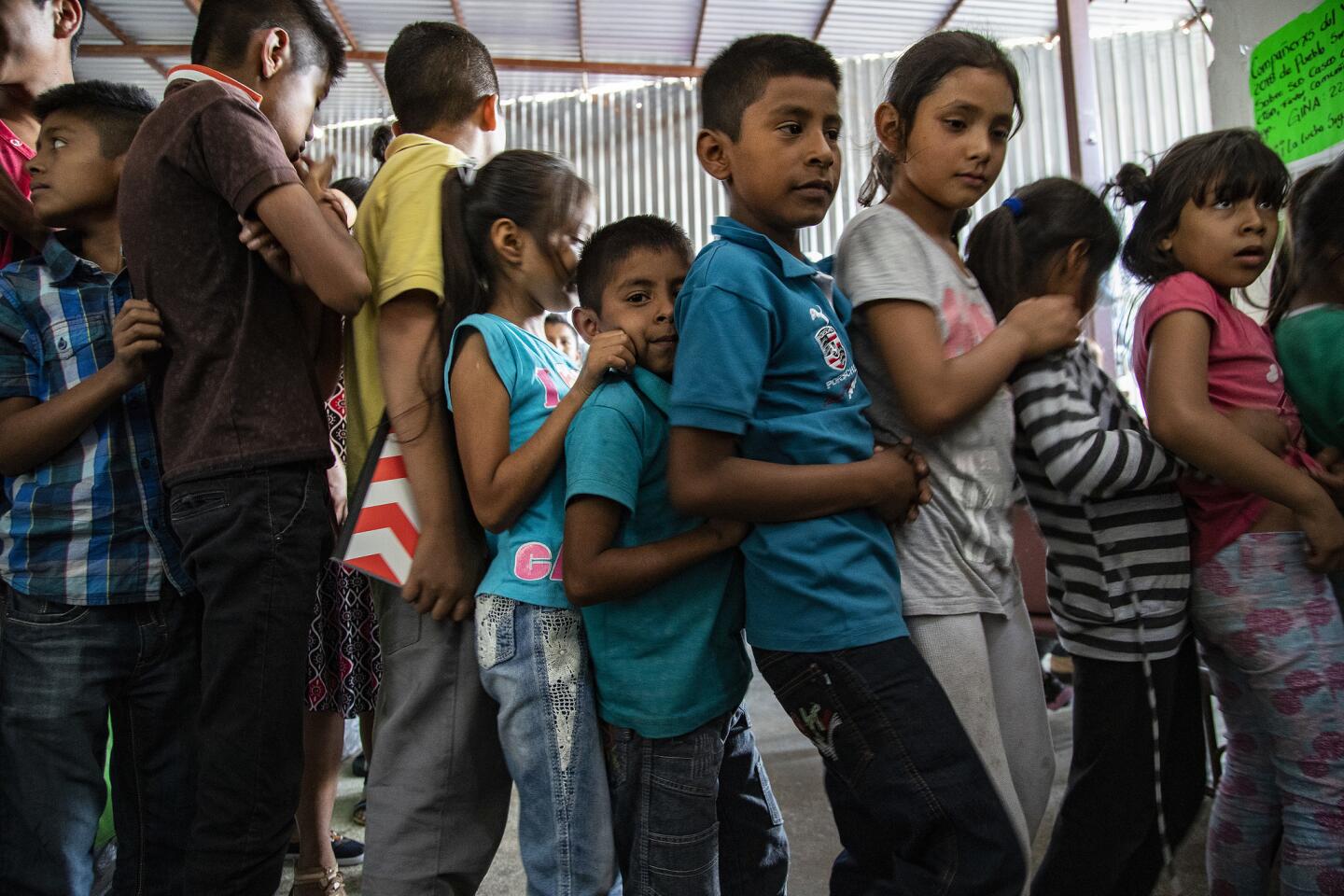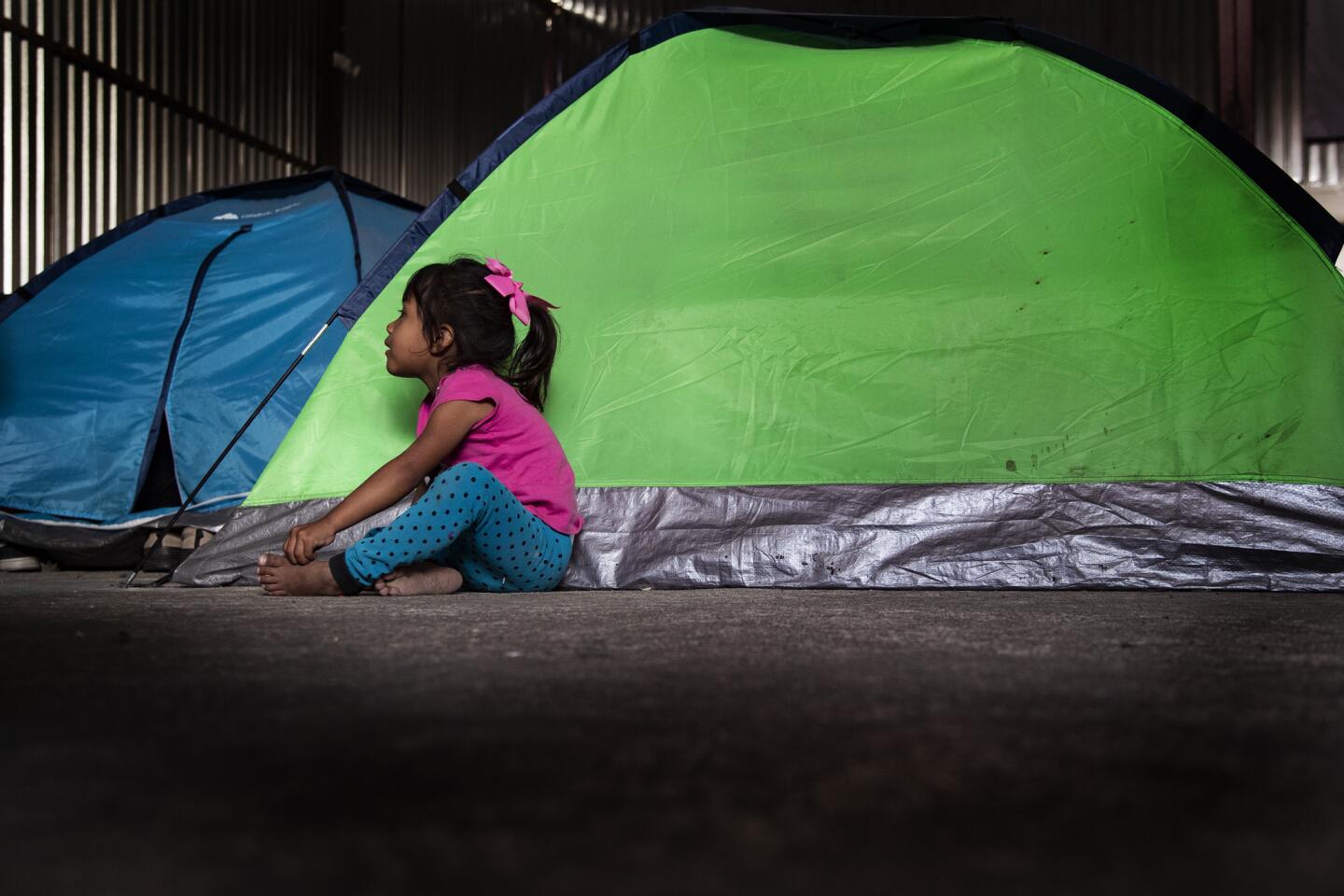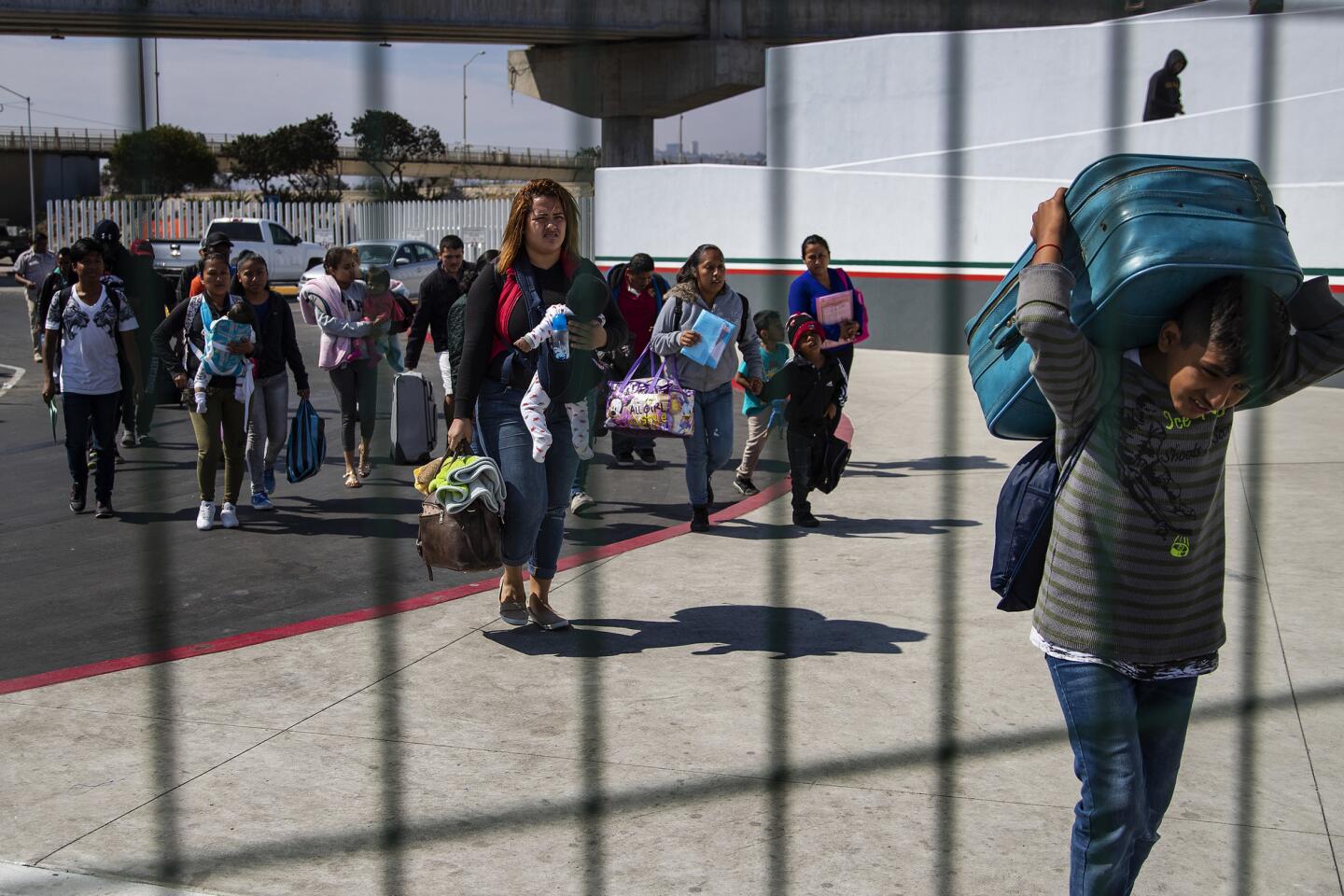Trump orders end to his family separation policy at the border, but relief could be temporary

President Trump suggested Wednesday he would sign an executive action to end the family separation crisis.
Reporting from Washington — In a rare retreat to dispel outrage about his “zero tolerance” policy at the southern border, President Trump on Wednesday signed an executive order to end a six-week-old practice of separating children from parents illegally crossing into the United States.
His directive seeks to keep families together in detention. That is likely to open a new legal battle, however, over a landmark 21-year-old court settlement known as the Flores agreement under which the federal government agreed to hold immigrant minors no longer than 20 days. Immigration cases typically take much longer than that.
The order could well be temporary. Administration officials called the order a stopgap measure, and refused to say what they would do with the migrant children in three weeks, should they fail to get a court’s exemption or pass legislation through Congress. Nor did the administration have plans to begin reuniting families already separated.
The president, in his order, asked the Justice Department to expedite cases involving families. Yet he also directed Atty. Gen. Jeff Sessions to ask the federal court in Los Angeles that has overseen the Flores settlement essentially to overturn it, allowing the government to detain families indefinitely pending resolution of their cases. Such action is certain to be challenged by immigration advocates.
Trump also ordered the secretary of Defense to make facilities available on military bases “for the housing and care of alien families,” or to construct new ones.
“We’re going to have strong, very strong borders, but we’re going to keep the families together,” Trump said just before signing the executive order in the Oval Office. “I didn’t like the sight or the feeling of families being separated.”
Only days ago, Trump had insisted, “You can’t do it through an executive order.” Amid mounting backlash, however, during a meeting with Republican senators and House members earlier Wednesday, he announced his intention to sign just such an order.
“We still have to maintain toughness or our country will be overrun by people, by crime, by all of the things that we don’t stand for and that we don’t want,” the president said to reporters at that meeting.
“If you’re weak, you’re pathetically weak, your country’s going to be overrun with people,” Trump said. Scoffing that some equate being strong with having no heart, he added, “I’d rather be strong.”
Although the president insisted that “zero tolerance” continues to define his overall approach to illegal entry, his reversal on the family separation policy announced in May was remarkable given his aversion to admit error or back down. That reflected the White House’s desperation to quash one of its worst crises to date — one that drew condemnation from Democrats as well as some Republicans, all four living former first ladies and conservative and liberal religious leaders.
Yet Trump risked angering the most anti-immigrant elements of his base, after he’d been claiming that family separation was an essential part of a tough immigration agenda to end what he calls his predecessors’ lax border enforcement and prevent children from being used as “keep out of jail free” cards by child smugglers and other criminals.
The crisis had consumed his administration for days as Republicans and Democrats reacted to searing pictures and audio of young migrant children crying at being separated from their parents after crossing the border from Mexico, many to seek asylum from violence in their home countries.
The administration said more than 2,300 children were taken from their parents, who are detained for criminal prosecution, and held in separate detention facilities in 17 states. The separations climbed rapidly after the administration began its “zero tolerance” policy, requiring more criminal prosecutions on top of civil deportation actions.
The administration has argued that the 1997 Flores settlement forced it to lock up children separately from their parents. Past administrations mostly avoided that by releasing parents with their children pending civil hearings and by not pursuing criminal prosecutions nor civil deportation actions, as the Trump administration had begun doing.
“President Trump’s Executive Order is deceptive and dishonest and shows the total disarray of his policy regarding detained immigrant children,” attorney Peter Schey, who represented the plaintiffs in the Flores case and is the lead counsel in follow-up cases, said in a statement. He said he planned to fight the Trump administration in court and seek an order for immediate reunification of families.
Trump has claimed as recently as Tuesday that 80% of those released pending immigration hearings never showed up for their court dates and disappeared into the country. Federal data, to the contrary, suggest that most do show up, though a significant number are unaccounted for.
The administration’s insistence on trying to prosecute everyone crossing the border illegally, including asylum seekers who do not enter at the proper points, will continue to strain the immigration system despite the order, according to a former senior official of the Department of Homeland Security, who asked to remain unidentified.
“The criminal justice system does not have the capacity to intake all these people,” the former official said. “So at some point and time, the whole thing is going to break down.”
Democrats in Congress gave the president no credit for reversing his own policy, and objected to the ramifications of his order.
“Make no mistake: The President is doubling down on his ‘zero tolerance’ policy,” Sen. Richard J. Durbin of Illinois said in a statement. “His new Executive Order criminalizes asylum-seekers and seeks to indefinitely detain their children. Locking up whole families is no solution at all.”
Similarly, groups advocating for less restrictive immigration laws opposed the prospect of indefinite family detentions. “It’s definitely not a good solution,” said Megan McKenna, a spokeswoman for the group Kids in Need of Defense.
Overriding the Flores decision, she added, “just means that the United States would be able to house children in more restrictive settings for longer periods of time.”
Trump’s action “will replace one crisis for another,” said Anthony D. Romero, executive director of the American Civil Liberties Union. “Children don’t belong in jail at all, even with their parents, under any set of circumstances.”
Yet Sister Norma Pimentel, who runs a Catholic Charities shelter in McAllen, Texas, called Trump’s order “a step in the right direction.”
The shelter, with hot meals at the ready, took in about 50 immigrants with children released by Border Patrol on Wednesday. Many of the adults were released with ankle monitors and directions to appear in immigration court.
“The whole ‘zero tolerance’ policy is not helpful,” Pimentel said, but “it looks like we are going back to full [family] detention again.”
As the administration and Republican lawmakers sought to resolve the crisis, the signs of confusion were evident — even after Trump signed his order.
Administration officials could not answer numerous questions, including when authorities would begin enforcing the order and how previously separated families would be reunited.
“This is a stopgap measure,” said Gene Hamilton, counselor to the attorney general. “The president’s doing everything he can here within the bounds of his existing authority.”
But he stressed that Congress or the federal courts must act to make permanent the changes sought by the administration, to extend the amount of time families can be held together in detention.
Kirstjen Nielsen, the Department of Homeland Security secretary, spent the morning at the White House, urging Trump to pursue congressional action to end the family separations. Sessions, the longtime anti-immigration advocate who announced the family separation policy in May, was at the Capitol to meet with exasperated Republican lawmakers.
Some lawmakers who had been hopeful that the pressure created by the outcry would force agreement on a long-sought, comprehensive immigration compromise expressed frustration that the president is opting to act on his own. Trump, too, had intended to use the demands for action against family separations as leverage to get Congress to pass his proposed immigration limits and funding for a border wall.
“It takes care of a political problem, but it doesn’t take care of a policy problem,” Sen. Charles E. Grassley (R-Iowa) told reporters.
“It takes the heat off,” he added, “and that’s too bad.”
Yet other Republicans were not optimistic that any of the party’s competing immigration proposals could pass and become law, given divisions between conservative and moderate Republicans and opposition from Democrats.
Senate Democratic leader Charles E. Schumer of New York had sought to put pressure on Trump to end the separations himself. “He seems content to let Trump own this,” said one senior Democratic Senate aide.
The president’s action, after days of defiance, scrambled House Republicans’ plans to take up broader immigration legislation Thursday, including a provision to end family separation. That legislation wasn’t expected to become law, given Senate opposition, which is why many Republicans wanted Trump to act now to end family separations.
House Republicans had said earlier Wednesday that they were forging ahead with their plans for Thursday votes. After word broke of Trump’s retreat, a group of House Republican leaders, including Speaker Paul D. Ryan, hustled to the White House to figure out next moves.
The House legislation also would provide billions of dollars for Trump’s dream of building a border wall, make steep cuts to legal immigration programs and provide legal status to so-called Dreamers who were brought to the country illegally as children years ago.
The president said he still wants passage of a broad immigration bill, and House Republican leaders were pushing recalcitrant members hard to support it. Prospects remained dim, however, as most Democrats are expected to oppose the legislation along with Republican conservatives unwilling to support granting citizenship to Dreamers.
Senate leaders from both parties also have expressed little support for the House’s approach.
Though lawmakers appeared blindsided by Trump’s reversal, many were relieved that he backed down. The separation policy, which he has falsely blamed on Democrats and the requirements of current law, triggered the most intense backlash from lawmakers and the public since his first attempt in 2017 to impose a travel ban against several Muslim countries, which unleashed chaos at airports nationwide.
Republicans in tough races were facing questions about family separation just months before the midterm election. Rep. Chris Collins (R-N.Y.) said that he typically doesn’t like executive orders but that he supports anything “to put this behind us.”
Democrats said Trump’s sudden reversal showed the crisis was one of his own making. “The president created this problem. The president is free to fix it,” said Rep. Pete Aguilar (D-Redlands).
More stories from Sarah D. Wire »
Follow @sarahdwire on Twitter
Read more about the 55 members of California’s delegation
UPDATES:
4:55 p.m.: This article was updated with a quote from attorney Peter Schey.
3:30 p.m.: This article was updated with comments from Justice Department counselor Gene Hamilton and additional details.
2:35 p.m.: This article was updated with new details from the executive order and additional reaction.
12:15 p.m.: This article was updated after Trump signed the order, along with reaction and additional analysis.
10 a.m.: This article was updated with a Trump quote and more House GOP action.
9 a.m.: This article was updated with Trump comments and administration deliberations.
This article was originally published at 8:20 a.m.
More to Read
Get the L.A. Times Politics newsletter
Deeply reported insights into legislation, politics and policy from Sacramento, Washington and beyond. In your inbox three times per week.
You may occasionally receive promotional content from the Los Angeles Times.
